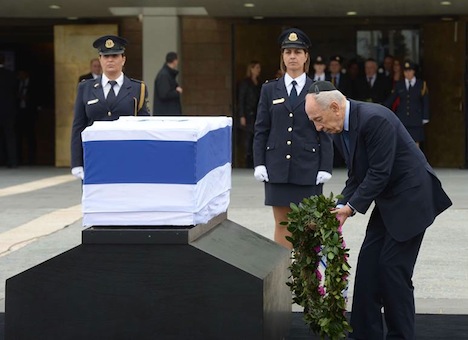Even though Israel has now lost Ariel Sharon, the curtain hasn’t fallen completely on the generation of leadership forged by the 1948 war for independence. Shimon Peres will leave the Israeli presidency in July with enough power and potential for one last attempt to secure a Palestinian peace, I argue tomorrow at The National Interest:![]()
[P]eres, himself a former prime minister, is also part of that group, and it would be overhasty to omit his future potential. At age 90, Peres has already outlived Sharon by five years, and he has indicated that when he steps down in July after seven years as Israel’s president, he could take one last shot at the goal that’s eluded him over decades of public service: a Palestinian peace deal.
He’ll do so not as a stalwart of the Israeli left or as the longtime nemesis of current Israeli prime minister Benjamin Netanyahu, 26 years his junior, but as the last lion of the ’48ers—a statesman whose mentor was Israel’s first prime minister, David Ben-Gurion, and who found common cause with rivals, including [Likud prime minister Yitzhak] Shamir, [his Labor Party rival and prime minister Yitzhak] Rabin and Sharon, in the hopes of achieving a more secure future for Israel.
I argue that if Peres were to return to active politics for one last push, it would be in the spirit of finishing what Sharon started, though the two politicians spent much of their careers on opposite sides of the political spectrum — Sharon, the ‘bulldozer,’ the hard-charging defense minister and champion of Israeli settlers; and Peres, the longtime Labor leader and the figure most associated with the ultimately failed 1993 Oslo peace accords:
[T]here’s a space in Israeli politics for a galvanizing figure to build an effective anti-Netanyahu coalition with the single goal of achieving a deal with Palestinian president Mahmoud Abbas. There are already rumblings that Peres will start a new political party this summer, with the reported support of Mossad (foreign intelligence) chief Meir Dagan and Yuval Diskin, the former head of Shin Bet (Israel’s security agency). In many ways, if he were to do so, Peres would be picking up in 2014 where Sharon left off in 2006.
